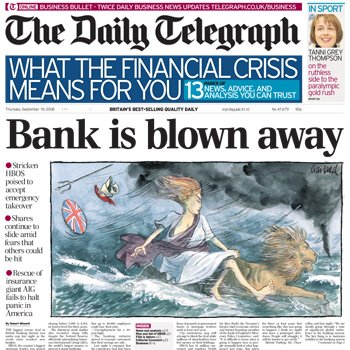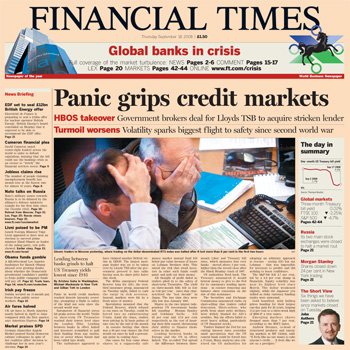McCain, Obama Confront the Market
By NICK TIMIRAOS and ELIZABETH HOLMES
Wall Street Journal, Sept. 16
The U.S. banking crisis is shaking up the presidential race as well as the agenda of the next president, forcing both candidates to confront a financial calamity. John McCain and Barack Obama jockeyed to seize an advantage on the financial crisis, signaling how Wall Street's troubles have become a bigger concern on Main Street. The candidates wrapped the market instability into broader campaign themes but found themselves wrestling on unfamiliar territory.
Republican candidate Sen. McCain pointed to his credentials cleaning up Washington's excesses while Democratic candidate Sen. Obama blamed the crisis on Washington's deregulatory bent over the past three decades. Both candidates blamed Wall Street greed and special-interest influences in Washington. "We've seen self-interest, greed, irresponsibility and corruption undermine these hard-working American people," Sen. McCain said at a rally in Orlando, Fla., where he promised to "put an end...to running Wall Street like a casino." He offered no specific prescriptions but did call for ending "multimillion-dollar payouts to CEOs that have broken the public trust." Sen. McCain pushed the need for an updated regulatory system, a cry he began this spring. "And there's an alphabet soup of different agencies, and they have to be streamlined, they have to be consolidated, and they have to be effective," he said. "Those regulators have been asleep at the switch, and we've got to fix it." Sen. McCain also promised he wouldn't use taxpayers' dollars to solve the problem.
Sen. Obama singled out the Bush administration's deregulatory push for what he described as "the most serious financial crisis since the Great Depression." While Sen. McCain wasn't at fault, he said, "I do fault the economic philosophy he subscribes to...one that says we should give more and more to those with the most and hope that prosperity trickles down."
While the candidates and their running mates focused on the financial crisis Monday, all four found themselves in unfamiliar territory. Sen. McCain and his running mate, Alaska Gov. Sarah Palin, have little experience dealing with financial crises, and neither do Sen. Obama or his running mate, Sen. Joe Biden, whose expertise is in foreign affairs. Sen. McCain's campaign pointed out that the senator had talked with Treasury Secretary Henry Paulson for "seven to 10 minutes" and contacted his economic team, including former Hewlett-Packard Co. head Carly Fiorina. Sen. Obama said he spoke about the market turmoil Monday morning with his economic team, including former Fed Chairman Paul Volcker and former Treasury Secretary Lawrence Summers.
Regardless of who wins the election, the crisis will further constrain the next president, sapping time and money from proposals on health care and tax relief. Both sides have promised more regulation of financial institutions and more transparency for investors. Sen. McCain has called for tougher measures to overhaul Fannie Mae and Freddie Mac. Sen. McCain Monday stressed the importance of allowing homeowners to refinance their mortgages, saying that the financial markets couldn't stabilize until the housing market found a bottom.
In a March speech on financial-market overhaul, Sen. Obama called for extending commercial-banking regulations to investment banks, hedge funds and mortgage brokers. He called for a commission that would monitor threats to the financial system. He said deregulation that culminated in 1999 with a partial repeal of the 1930s' Glass-Steagall Act, which had separated investment banks and commercial banks, had been driven by lobbyists and was intended primarily to facilitate mergers.
Neither candidate backed a government rescue deal for Lehman Brothers Holdings Inc. over the weekend. But each offered few specifics about what they would do. "We are going to have a lot of rebuilding to do," Sen. Obama said at a rally in Colorado. The McCain campaign released a new ad Monday to capture the mantle of reform by promising tough changes to "protect your life savings."
Sen. McCain promised to overhaul the regulatory system. Among the problems Sen. McCain has identified, according to policy head Doug Holtz-Eakin, is the lack of a clearing house for derivatives so investors know the risks they entail; the lack of accountability for mortgage brokers; and the overall lack of capital backing in the system.
Both candidates had rushed to address the need for regulatory overhaul in March after the collapse of Bear Stearns Cos., but until the government was forced to backstop Fannie Mae and Freddie Mac last week, the financial crisis was viewed as a problem that concerned Wall Street bankers but not rank-and-file workers.



